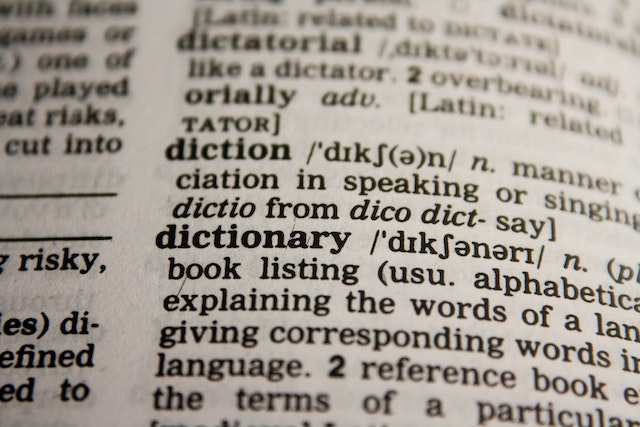
Who made the first English dictionary? Robert Cawdrey in 1604.
There was no need for a dictionary throughout most of the history of the English language. Up until the invention of the printing press, in about 1436, words were spelled in several different ways, and often as they sounded. For example, egg could be spelled as “eg”, “egg”, or “egge”. Not many people could read and the manuscripts, which were more often than not religious texts, were meant to be read aloud. Punctuation began its life as guides to pronunciation. Most books were copied by monks and spelling mistakes abounded. Then, when William the Conqueror invaded England, French became the language of bureaucracy and there was no move to standardize English spelling. As the printing press took hold and books were printed, the printers wanted to standardize English spelling to make their jobs easier. Paper was available and books could be more easily produced, spreading these spellings far and wide. Schools sprang up to train a new class of clerics and it was important to teach everyone the same thing. In this period, the number of new words in English increased rapidly. Between 1500 and 1650, the number of English words doubled, many of the new words being coined from Latin and Greek, or brought in on the new and expanding trade routes.
Many people know of the English dictionary that Samuel Johnson created. In 1746, a group of booksellers in London asked Johnson to write a dictionary. They paid him the equivalent of about $250,000 in today’s money. It took him 9 years and the finished result contained 42,773 words. It was a tremendous undertaking for a single man and stood for years. It had grammatical errors and mistakes in the etymology of the words, but it was a phenomenal work and it influenced the English language tremendously.
However, as amazing as his dictionary was, he was not the first person to write one. That honor goes to Robert Cawdrey. He was a school teacher in England and he became a priest in 1570. He was forced to step down in 1588 and returned to teaching. While he was employed as a teacher, he wrote “A Table Alphabeticall”, which was the first English language dictionary.
Bilingual dictionaries had existed for a long time. There were many dictionaries that could be used to translate from Latin or Greek into English, but there was no dictionary that explained what English words meant. Cawdrey took it upon himself to make one. He had decided that many people were having trouble using or understanding many of the new words that had come into English. He thought that people were oversimplifying their English or becoming confused by all of the words. He thought that a list of the most difficult words and their meanings would help people.
The complete title of his book is:
“A table alphabeticall, conteyning and teaching the true writing, and vnderſtanding of hard uſuall Engliſh words, borrowed from the Hebrew, Greeke, Latine, or French, &c. With the interpretation thereof by plaine Engliſh words, gathered for the benefit and helpe of ladies, gentlewomen, or any other vnskilfull persons. Whereby they may the more eaſily and better vnderſtand many hard Engliſh words, vvhich they ſhall heare or read in Scriptures, Sermons, or elſe vvhere, and alſo be made able to vſe the same aptly themſelues.”
He chose 2,543 words that he felt people should know. Each word has a short explanation, although nothing by modern standards. He also marked whether the word had Greek, Latin, or French origins. For example,
- physicke, (g) medicine, helping, or curing
- phlebotomie, (g) letting bloud
- phrase, (g) forme of speach
- philosophie, (g) study of wisdome
- phrensie, (g) madnes
- pietie, godliness, holines
- [fr] pillage, spoile in warre, and sacking, of
the enemies. - pinguiditie, fatnes, or greasinesse
His dictionary was finished by 1604 and he had it printed. Copies were sold at the book shop by the north door of St. Paul’s Cathedral in London. The book turned out to be quite popular and he went on to write two more editions. He increased the number of words each time and the third edition in 1617 had 3,264 entries.
Other dictionaries followed along after Cawdrey’s and Samuel Johnson wrote his mammoth dictionary 142 years later. Johnson added etymology and examples to the definitions. Although, even Johnson’s dictionary pales when compared to modern dictionaries. The largest printed English dictionary is Webster’s Third New International dictionary, and it has 500,000 definitions. The largest online English dictionary is Wiktionary, and it currently has over 1.3 million definitions.
So, the first dictionary was created by Robert Cawdrey and he had the goal of helping people understand more difficult words. And this is what I learned today.
https://www.dictionary.com/e/johnson/
https://www.bl.uk/learning/timeline/item102970.html
https://en.wikipedia.org/wiki/Robert_Cawdrey
https://extra.shu.ac.uk/emls/iemls/work/etexts/caw1604w_removed.htm
https://www.bl.uk/collection-items/robert-cawdreys-a-table-alphabeticall
https://en.wikipedia.org/wiki/A_Dictionary_of_the_English_Language
https://www.ruf.rice.edu/~kemmer/Histengl/spelling.html
https://en.wikipedia.org/wiki/List_of_dictionaries_by_number_of_words
https://en.wikipedia.org/wiki/Table_Alphabeticall
